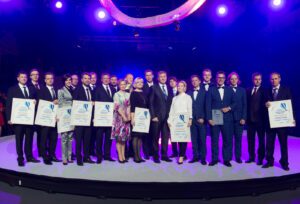
Can one travel anywhere without seeing the human imprint? Mattias Klum has photographed the beauty of nature in more than one hundred countries. His answer to the question is: No, you can’t. Or at least, it is very difficult to find such places. He describes it as walking through hell most of the times and finding slices of heaven some of the times. During the celebration of Greencarrier’s 15 years jubilee, Mattias Klum taught us about the ecosystems, the human imprint, the world economy, and sustainable transportation – and how it all fits together.
What we do in one part of the world, affects another
“Everything is connected”, Carl Von Linné, a renowned Swedish botanist said in the 18th century. Today, it is more true than ever. Not only are we connected genetically, but also hydrologically, and even technologically. It all starts with nature. Everything is interlinked; the Arctic affects the tropics and the tropics affects the Antarctic. What we do in one part of the world, affects another.
The ecosystems on our planet are crucial and cannot function without their inhabitants. We need to have gorillas in our mountains, fish in our oceans, and birds in our rain forests. This is important because every single species in the ecosystems is part of our life support system. Nature provides us with the services we rely on such as fresh water, hydrology, rainfall and pollination.
Within the beauty of nature lies a stability, which we humans have built our entire foundation on. So what happens when we destabilize the ecosystems? We destabilize the foundation we rely on.
The vulnerability of the ecosystems
25 000 elephants have been killed in eastern Tanzania only in the last four years. The largest sweet water delta in the world is the Okavango Delta in Botswana. Each year approximately 11 cubic kilometres of water spreads over an area up to 15,000 square kilometres. The delta is part of the ecosystem of the entire Africa where the elephants are ecosystem engineers. It simply doesn’t work without its elephants.
75% of all tropical corals are not doing well. In fact, about 30% of them are dying right now. This affects the ecosystems in all of our oceans.
Today, 75% of the rainforest in Borneo has been logged due to the production of palm oil. It has been misused for a very long time and is now completely unstable. Bureaucracy and corruption have lead to one of the greatest misuse of an ecosystem in the history of mankind. Borneo has changed so quickly and drastically that it has affected the hydrology and stability in the entire south-east Asia, and even the world.
How we can use nature in a smarter and more sustainable way
The forest cobra is one of the most deadly snakes in Africa. Right now, it is undergoing clinical trials for drugs as the venom of the snake actually can be used to cure cardio vascular disease. This is an example of how we can use nature in a smarter way! The yellowtail barracuda is found in Indo-West Pacific oceans. Today, it is used in fish spas where it eats away dead the skin from our feet. This is another example of how ingenious nature is, as soon as we acknowledge it! The great argus is native to the jungles of Borneo, Sumatra and the Malay Peninsula in southeast Asia. The great argus is an indicator species, which means it indicates the environmental conditions in the rain forest. It can actually act as an early warning to monitoring biologists!
Within nature’s ecosystems, there are so many shortcuts that normal pharmacological research cannot provide. By looking at nature and examine our species, we can learn how to use nature in a smart and sustainable way, and at the same time keep our life support system alive. But we cannot do this if we continue to destabilize our ecosystems.
What happens when the ecosystems are hit by human impact
When the ecosystems are stable, they deliver services to us humans. They provide us with the forest cobra and the yellowtail barracuda, which we can use for a good cause! But when the ecosystems are hit by negative human impact, like for example overfishing, they become unstable. Fortunately, nature is an expert at coming back to full force, and the ecosystems will incorporate eventually, if we just give them some time to heal.
But when nature is hit, not only by overfishing but also dynamite fishing, cyanide fishing, eutrophication and climate change, it doesn’t cope so well. It takes a very long time for the ecosystems to come back to their stable states again. Right now, we don’t give nature enough time to recover. Consequently, nature stops providing its services to us. And it can be very costly.
How putting pressure on nature affects our economy
Mistreating nature the way we do, does not only affect the ecosystems, but also our health, our businesses, and our economy. For example, the fires in southern Borneo due to logging have had such a huge effect on crop yields in Asia, that countries have lost billions of dollars. 10 000 years ago we managed to understand nature so that we could create agricultural systems. Today, we need to find smarter and more sustainable ways to produce things, without destabilizing nature too much, and at the same time giving it a chance to heal.
What the transport sector can do to support the ecosystems
The ecosystems can only take so much, and we certainly are behind schedule! The good news is that we have the opportunity to turn page and enter a new chapter. There are so many possibilities and new technologies to create a better life and more business opportunities.
When it comes to environment and sustainability, the transport sector is often pointed out as the bad guy. This is not necessarily the case. We shouldn’t stop transporting goods. Instead, we should create smarter and more sustainable ways of getting the goods from one place to another. Looking at the amount of air freight versus sea freight, for example, it could be about finding the right balance. If we, as a transport and logistics company, also can cooperate with the production units in a better way, we can contribute to supporting the ecosystems and keeping them stable.
Greencarrier wants to preserve nature’s slices of heaven
At Greencarrier, we are determined to continue to take responsibility for the environment. By preserving, loving and caring for the beauty of our planet, we can create a future that holds better profitability – within the limits of what the ecosystems can actually cope with. If we can do this, we can be part of creating a few more of those slices of the heaven that Mattias told us about!
/The Blogging Crew
Did you enjoy reading this article? Please let us know by sharing it in social media! For more info about Greencarrier, please visit our website.
Mattias Klum is a Swedish freelance photographer and filmproducer in natural history and cultural subjects. He has produced a number of articles and cover stories for the National Geographic Magazine, and has published thirteen books. Mattias Klum also established Tierra Grande Publishing. For more info about Mattias Klum, visit his website.



